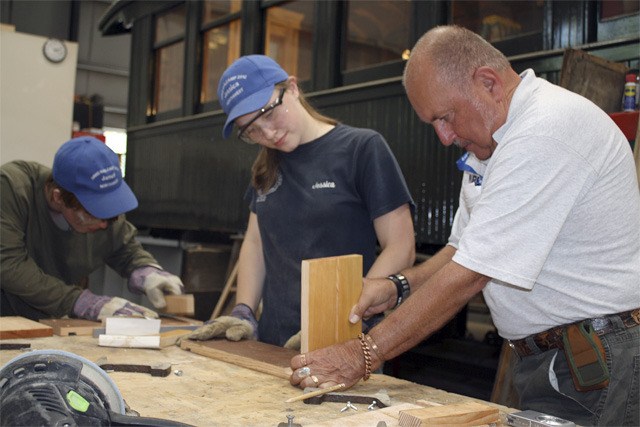

Seth Truscott/Staff Photos
Above, Kevin Phalon, 17, of New Pequannock, N.J., scrapes old, parched laquer from the interior of the Railway Museum’s century-old Messenger of Peace.
Below, Northwest Railway Museum Executive Director Richard Anderson helps teen John Grocki of Garden City, Long Island, with his souvenir project.

First one teen, then another steps onto the ladder, takes the scraper and starts cleaning 50-year-old gunk from the wooden interior of Messenger of Peace.
While some teens might drag their heels on household chores, these hands-on activities at the Northwest Railway Museum seem to draw in the dozen teenage participants in RailCamp Northwest, which recently visited the Snoqualmie heritage site.
Open to high-school-age boys and girls, the camp, organized by the National Railway Historical Society, has run for 15 years on the east coast, but made its first visit to the left coast earlier this month. Most participants were from back east, but several learned about it in the Northwest. So far, the camp has been a big success, counselors said.
Campers spent their first day with Sound Transit, the next with Tacoma Rail, the third at the Northwest Railway Museum, and the fourth at the Mount Rainier Scenic Railroad, before returning to Snoqualmie.
The teens got a chance to inspect locomotives in Tacoma, and assemble power units for trains. Here in the Valley, they got to help volunteers working to preserve Messenger of Peace, a 114-year-old chapel car that served the region generations ago. They also used the museum’s tools at the Conservation and Restoration Center to make souvenir bookshelves made in part from train tracks salvaged in Seattle.
“It’s testing us,” said teen Jessica Fleming of St. Maries, Penn, as she worked in the museum’s workshop. “But it’s lots of fun.”
Trains are already a part of her life. Fleming’s family owns a small-gauge railroad at their home.
RailCamp “helps you experience a lot more than you’d usually get to experience,” she said. “I don’t know how many other 15-year-olds can say they got to do this.”
The camp gives teens who are interested in railroading a sense of the jobs that are out there in the industry. It helps maintain the history and heritage of trains, through the past to the future.
Rail is still important, counselors say.
“Sometimes, the kids’ peers say, ‘You must be some kind of nut! You’re into railroads?'” said camp counselor Bill Chapman, who hails from Boise.
But Chapman counters with the example of the humble, high-tech cellphone.
“All of its parts were taken by rail to a port, put on a ship to Asia, made into a cell phone. It came back, was put into a container and shipped to the store where they bought it by rail,” Chapman said. “So if you don’t think you have an interest in railroads, you do, if you have an interest in iPhones.”
“This is their commitment to engaging the youth of today,” said Richard Anderson, Northwest Railway Museum’s executive director. “Railway heritage is something that had a profound effect on the country.”
“There was a time, not so long ago, when trains affected every aspect of life. Your mail came by train, your groceries came by train, you visited relatives by train.
“The people who actually experienced it are, frankly, in the process of passing on,” Anderson said. “It’s important that the coming generations carry this forward.”
So it’s good for folks like Anderson, then, that young campers like Fleming understand that trains aren’t just relics, but have meaning today.
“They were good in the past, and they keep getting better,” Fleming said.
Learn more about RailCamp at nrhs.com/program/railcamp.


